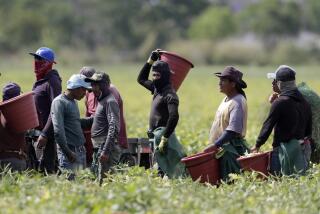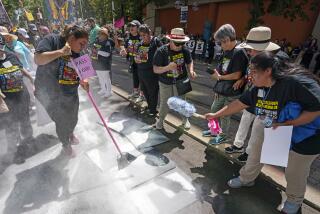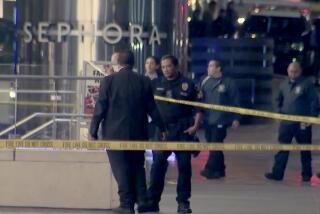Low-wage workers face retaliation for demanding COVID-19 safety measures at work
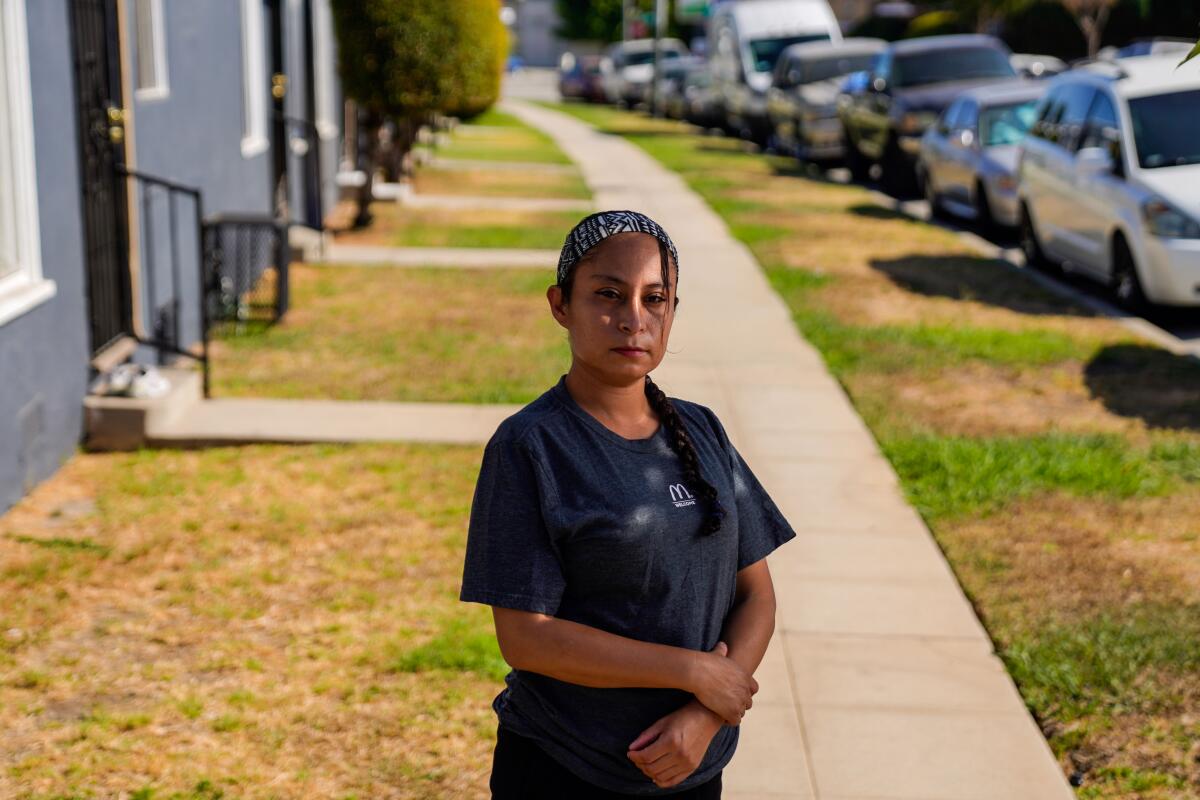
In early June, Lizzet Aguilar went on a four-day strike. She demanded that the McDonald’s location in Boyle Heights where she worked provide employees with adequate protective equipment and enforce social distancing to fight the coronavirus.
Aguilar, 35, said that a supervisor treated her more harshly after the strike in retaliation for her activism, telling her to work faster and instructing other employees not to help her.
“She was tougher with me, stricter, and started to yell more,” Aguilar said.
Coronavirus cases have surged in California over the last two months, fueled by the reopening of the economy. Though public health officials say making workplaces safer is essential to slowing the virus’ spread, fear of retaliation is preventing many employees from voicing safety concerns, workers and labor organizers say.
The toll has been particularly hard on essential workers, a sizable percentage of whom are people of color toiling in factories, hospitals, retail establishments, hotels and agricultural fields across the state. Many who are reluctant to speak up are low-wage workers in the country illegally, who don’t qualify for unemployment benefits. They worry that if they are fired, they may not find another job in a hard-hit economy and won’t have a safety net.
“They’re not willing to risk their job security even though they’re risking their own health and their own safety … in a workplace where an employer is not providing the proper protections,” said Nicole Marquez-Baker, director of policy and legal services at the advocacy group Worksafe.
California law protects workers against retaliation for voicing safety concerns or refusing to engage in hazardous work. Those who feel they have been targeted can file a lawsuit or submit a claim with the state labor commissioner’s office.
Since Gov. Gavin Newsom issued a stay-at-home order March 19, the office’s Retaliation Complaint Investigation Unit has received more than 300 claims that mentioned the coronavirus. Of those, at least 95 are under investigation for health and safety issues, such as failure to enforce mandates on masks and physical distancing.
The number probably reflects “a fraction of the total claims out there,” said Amie Bergin, a senior deputy labor commissioner who works in the unit.
“Many of the workers we are seeing who are filing complaints are essential workers, many of them are undocumented workers, and they really are on the front lines of the pandemic,” she said.
The issue of retaliation has been brought to the forefront as government agencies ask workers for help holding business accountable for safety violations. The L.A. County Board of Supervisors recently passed a motion to consider creating public health councils composed of workers who would report noncompliance. Such councils might provide a more secure forum for employees fearing retaliation. County Health Officer Dr. Muntu Davis also has encouraged residents to report businesses they suspect are not disclosing positive cases.
The coronavirus surge among Latino workers has alarmed public health officials, with many saying the pandemic has heightened preexisting inequities and workplace exploitation. From garment factories in Los Angeles to food processing facilities in the Central Valley, workers have said safety rules are not always followed. When the coronavirus swept through the Los Angeles Apparel factory this summer, workers staged a work stoppage to demand better sanitation.
But the power dynamic — and the financial ruin of losing a job during the pandemic — has made such activism risky.
Aguilar has not returned to work at McDonald’s since workers staged another strike in early July, worried about getting her husband and 5-year-old son sick.
The Service Employees International Union, one of the country’s largest labor unions, has filed an unfair labor practice charge with the National Labor Relations Board, claiming that McDonald’s punished Aguilar “by assigning more onerous tasks and enforcing rules more strictly against her, in retaliation for her union activity.”
In a statement, McDonald’s franchisee R&B Sanchez, which operates the Boyle Heights location, said Aguilar’s allegations of retaliation and safety problems “are not true and do not at all reflect what is happening in our restaurant.” The business, it said, provides gloves and masks to employees, adheres to physical distancing guidelines and sanitizes regularly.
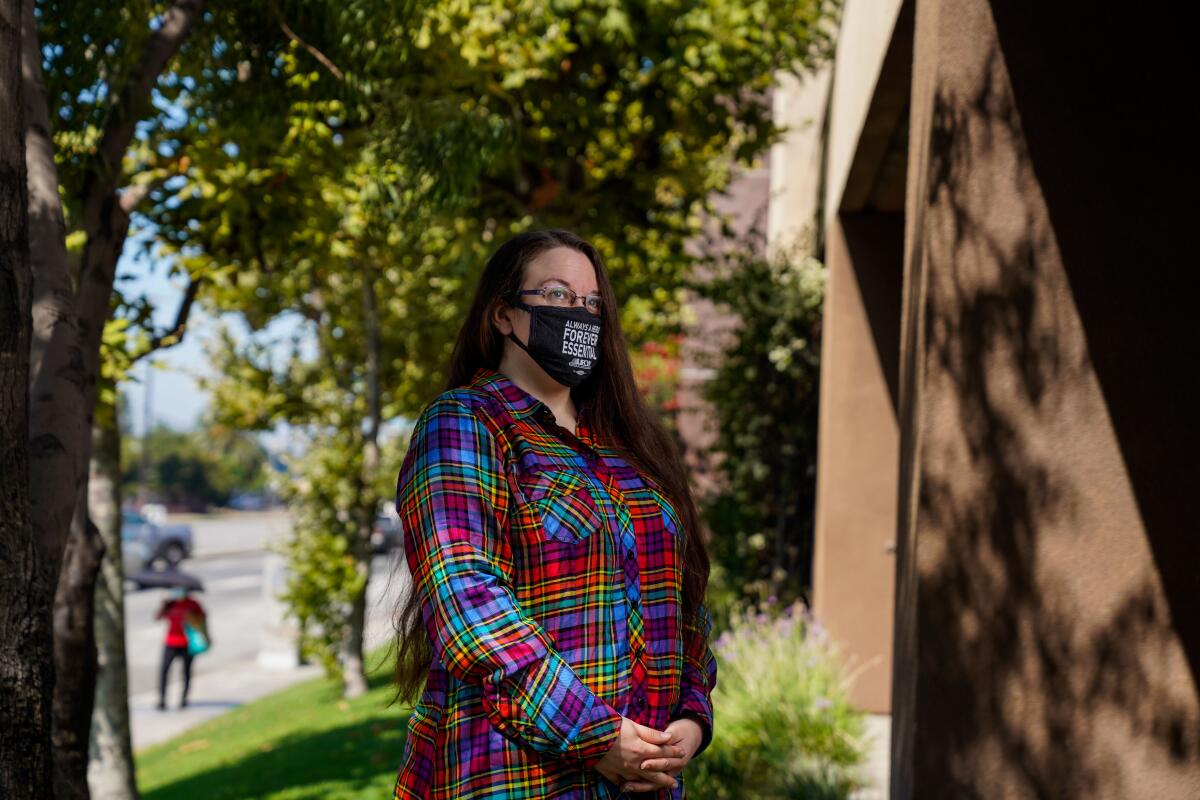
As alarm about the virus grew this year, Mary Mueller-Reiche suffered panic attacks while working as a cashier at a Ralphs store in Mid-City. The sight of customers crowding around checkout aisles made her feel trapped.
In late March, she brought up her concerns to the store director and was “basically just dismissed,” Mueller-Reiche, 34, said. After returning from medical leave in April, she asked the director about closing every other cash register but said she was accused of “creating drama.”
Mueller-Reiche then took two more weeks of medical leave, and upon returning to work, she said, supervisors and store management told her that customers had complained about her being rude when asking them to maintain physical distance.
In late May, she was told she was suspended and presented with a written warning that cited “inappropriate comments to management member,” “inappropriate behavior” and “previous inappropriate behavior by bringing spouse into the breakroom.” There was no elaboration.
“I believe they don’t want to deal with me … that it’s too much of a hassle to respond to safety concerns,” said Mueller-Reiche, who received help from her union, United Food and Commercial Workers Local 770, in filing a retaliation claim.
In a statement, Ralphs said it has “taken extensive measures to safeguard our associates, customers and supply chain” — including limiting store capacity to 25% of normal. Ralphs did not answer questions about the alleged retaliation, indicating that the company is handling the grievance according to its policy.
Other workers have claimed that their hours were reduced as punishment for going on strike.
Carlos Contreras, a 62-year-old delivery driver at a Domino’s location in West Adams, and his co-workers went on strike in April after they learned about several coronavirus cases in their store.
Domino’s “didn’t say absolutely anything,” Contreras said.
The strikers asked for a deep cleaning of the restaurant, adequate protective equipment and notifications for exposed workers so that they could quarantine. During the strike, which lasted about three weeks, Contreras was hospitalized with COVID-19. He later isolated himself in a hotel because he worried about infecting his family and took out a loan to cover the $1,300 stay.
Upon returning to work in early May, Contreras said, his hours — and those of other employees who had gone on strike — had been cut by about half.
In a statement, franchise owner Brent Hamill said he has established safety precautions that include advising sick workers to stay home and checking employees’ temperatures. He said claims that the restaurant had not alerted workers who may have been exposed to the virus were false.
As for reducing workers’ hours, Hamill wrote that the restaurant was short-staffed before the pandemic and that some employees had been scheduled for more than their typical hours. “Since COVID-19, with millions of people being laid off from their job, we have been able to fully staff, which reduces employee fatigue, creating a safer workplace, and allows new team members to provide for their families,” he said. “We try to evenly distribute hours to all employees, we simply have more team members now.”
Labor advocates said workers should be aware of the risk in speaking out.
Renee Amador, legal director of the Maintenance Cooperation Trust Fund, a statewide watchdog group that supports janitors, said it may be advisable for employees to raise concerns in writing, such as a text message to a supervisor, or to bring a witness when confronting a boss in person.
Workers alleging retaliation need only to assert they had “a good-faith belief” that working conditions were unsafe, said the labor commission’s Bergin. Retaliation can include termination, a pay or hours cut, or a move to a less desirable shift.
The issue is harder to address among domestic workers, who are excluded from protections provided by California’s Division of Occupational Safety and Health. A bill pending in the state Legislature would provide them those rights.
Cruz, a 35-year-old Mexican woman who cleans houses in Beverly Hills, requested to be identified only by her last name because she’s worried about losing work for speaking out. Many employers expect domestic workers to provide their own protective equipment, she said, and amid the pandemic want their homes disinfected with stronger chemicals.
“It’s better to keep quiet so that you don’t suffer consequences,” Cruz said. “You need more protections, but you also need to work.”
More to Read
Start your day right
Sign up for Essential California for news, features and recommendations from the L.A. Times and beyond in your inbox six days a week.
You may occasionally receive promotional content from the Los Angeles Times.
